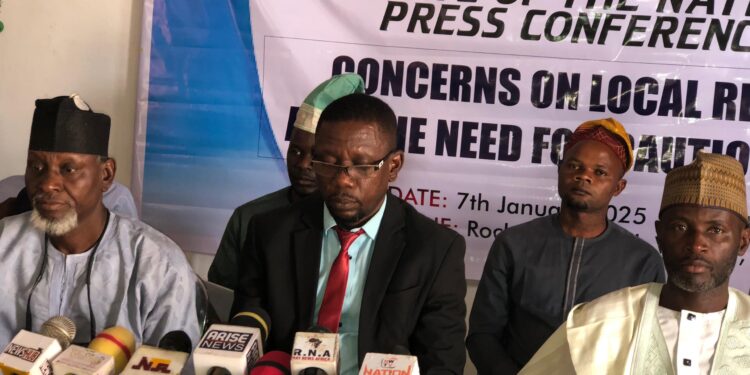A group of concerned Nigerian citizens has called on the Nigerian National Petroleum Company Limited (NNPCL) to prioritise crude oil supply to local refineries, including the Dangote Refinery, over foreign partners.
At a press conference on Tuesday in Abuja, the group expressed concern over reports that the NNPCL plans to cut down on crude oil supply to the Dangote Refinery from 300,000 barrels per day.
In an address by its national coordinator, Obinna Francis, the group alleged that this move is part of a larger scheme to monopolise the oil sector and frustrate local investors.
Francis noted that the removal of fuel subsidies has led to increased hardship and suffering for Nigerians, with a hike in the price of Premium Motor Spirit (PMS) leading to a rise in the prices of goods and services across the country.
The citizens also expressed concern over the NNPCL’s claim that the Warri and Port Harcourt Refineries are operational and producing at 60-70% capacity.
They questioned the basis for this claim, noting that the refineries have not produced a single liter of fuel.
Francis argued that the Dangote Refinery has been making efforts to make petroleum products affordable for Nigerians and that reducing its crude oil supply would undermine this effort.
The refinery’s operations, they noted, are not a burden to taxpayers, unlike the government-owned refineries.
The citizens called on President Bola Tinubu to intervene in the matter, stating that the NNPCL’s actions may be misconstrued as having the president’s consent.
Francis added: “Citizens are no longer surprised that the NNPCL has been insisting that the Warri and Port Harcourt Refineries are operating at between 60 to 70 per cent operational capacity. It is clear now that the game from the beginning was to pave the way and create an angle of plausible engagement aimed at reducing the quota of crude that is expected to go the Dangote Refinery.
“We argued that the coming upstream of the Warri and Port Harcourt refineries is not expected to cut down allocation to local refineries. The naira for the crude agreement was purely an intervention at the time to boost local production and then provide some cushion from the volatility of the foreign exchange market. It was not so much about the crude but the FX.
“If the Warri and Port Harcourt refineries are coming on stream, it is expected that it will make the price of petrol affordable for Nigerians and not become a stumbling block and a basis for adjustments of crude.
“Citizens will also want to inform the world that while Dangote Refinery is operating at no cost to the taxpayer, the NNPCL is embarking on Project Leopard, the operation, will enable the company to raise $2bn in total exchange for crude oil, thereby pushing the volume of loans for crude to $8bn within four years, with consequential adversity and growing debts for the nation.
“Few months ago, Oando loaned the NNPC $500m as part of another syndicated loan operation called Project Gazelle. Swiss group, Gunvor International and Nigeria’s Sahara Energy Resources, also took part in the $3.175bn operation, which was arranged by Afreximbank. These deals have continued despite complaints from domestic refineries that the national oil firm is not meeting its quota. The country’s average daily production stood at 1.8m barrels per day as of November 2024.
“There is overwhelming evidence that the private sector has served the Nigerian public and stakeholders better than government-owned and operated utilities and parastatals. Let us examine two recent examples: the power and telecommunications sectors before we return to the refineries.
“The federal government sold power-generating companies to the private sector some years ago. In the telecommunications sector, the government liberalised the industry in 2001 by selling GSM licences but retained ownership of the key operator.
“In each of the above examples, continued operation by the public sector led to billions of naira being lost on poorly managed entities. These entities deprived Nigerians of important services, fostered corruption and deprived important budget items, like education and health, of vital funds; in each case, privatisation or liberalisation – allowing competition from private business – solved the problem, and ensured the greater common good.
“On the refineries, we have also been down the road of reversing privatisation and retaining public ownership of these assets. In 2007, attempts by the administration to facilitate the sale of the refineries were reversed due to pressure by the unions and management renewed its commitment to revamp the refineries.
“Yet, in 2011 alone, Nigeria reportedly spent $760 million on refinery maintenance, and the operational capacity of the refineries hardly changed. In the five years since the reversal, we have spent over US$30 billion in oil subsidies. These sums spent on Turn Around Maintenance (TAM) could have collectively funded our health and education budget for three years.
“Under the Greenfield Refinery initiative, the Nigerian National Petroleum Corporation (NNPC) now Nigerian National Petroleum Corporation Limited (NNPCL) planned to undertake a public-private partnership project to expand local refining capacity, eventually settling on establishing a 350 000 BPD refinery in Lagos.”











